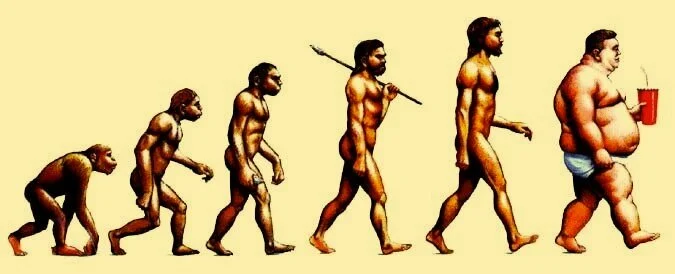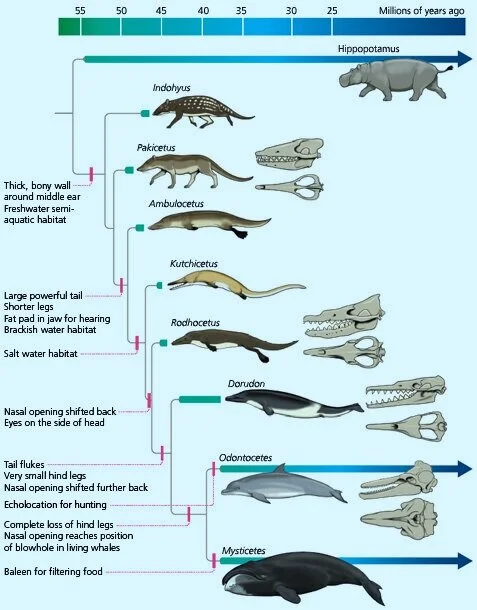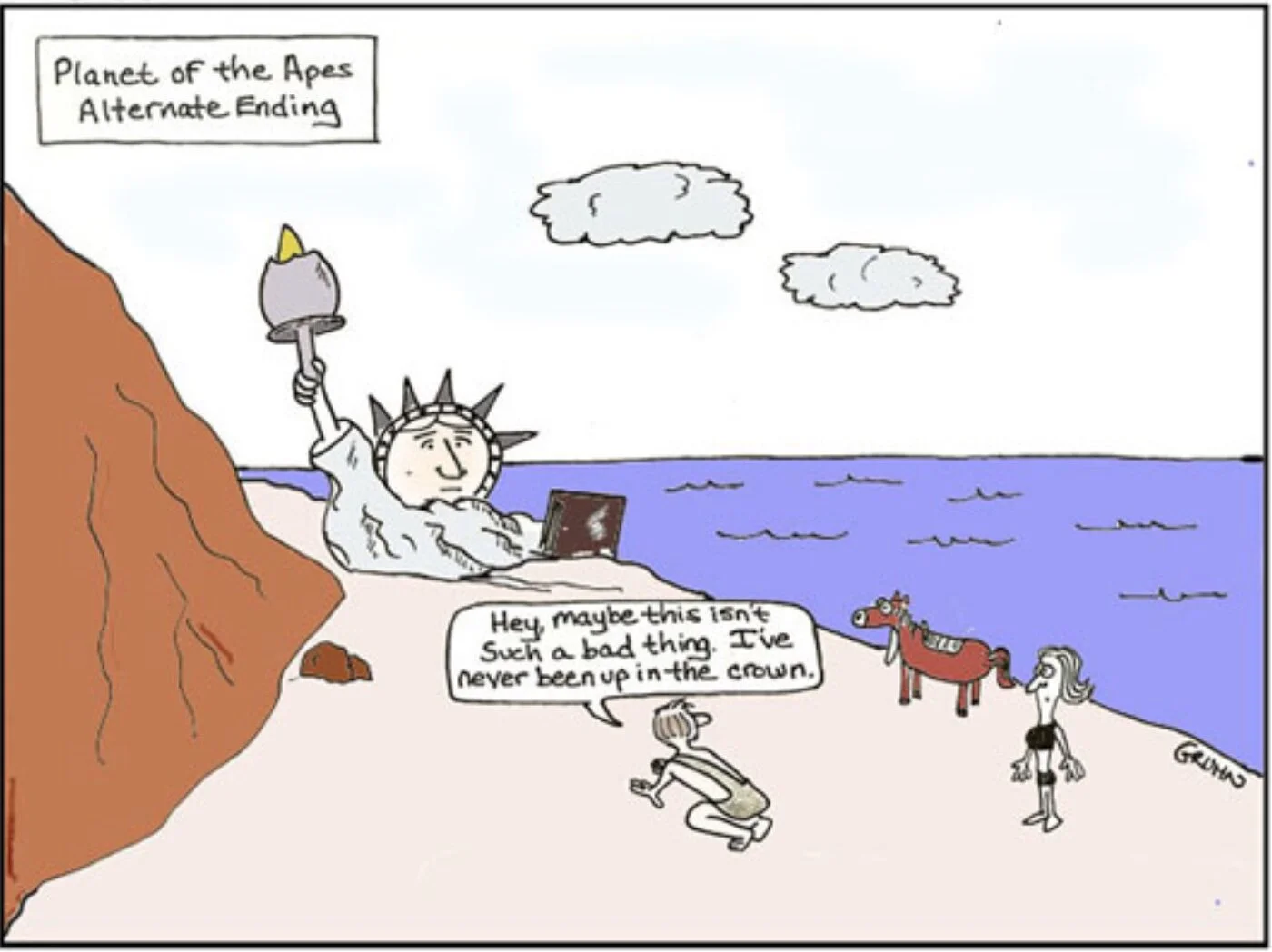By The Landord
A Missing Link
Evolution smells,
and reveals something.
Crawling out, and
out calling, constantly,
someone moves, always
moves forwards and backwards,
needing, seeking Solution A.
A solution seeking, needing
backwards and forwards moves,
always moves someone.
Constantly calling out,
and out-crawling,
something reveals and
smells evolution.
Written this very morning in the squint and blink of first light, this, like its subject, reads both ways. Whether you’d call this a poem, or a string of loosely conceived verbal DNA, what does it all mean? Well, put another way, this week’s topic is double-sided and two-way, seeking to capture both the good and the bad in the act of regressing, reversing and relapsing, an inevitable part of life, for whenever we move forward, we are always going to move back another way. And whether sliding back down bad habits and avenues, to coming back out of cul-de-sacs, it’s also a topic that can focus the on the personal and local, or the bigger picture when thinking of songs lyrics.
So have we, the human race, gone past our peak? Are we now de-evolving rather than evolving, gradually stepping back from full-height, taut-bodied, nature-tailored hunter-gatherers and Amazonians, after which we became grunting, stooping, grabbing agriculturalists to iron-fisted hammering, angry, greedy, gritty industrialists, fattening into flaccid financiers, portly pen-pushers, scheming, puny publicists, ever more twisted up in front of the candle, then the telly, then other screens that got both bigger, but also smaller?
Have we gained but also lost skills? We are now all mostly able to read, but, unlike our finely tuned gorilla cousins, who can detect and sniff out each tiny eyebrow twitch and grunt as a subtle sign of power shift, humans meanwhile are not only idiots without GPS and would probably die if the shops shut or delivery vans didn't arrive, and can no longer scent an animal or a storm in the air, we are also perhaps now far less able to read each other, perhaps because nuance and irony are distorted and shrivelled through the mass walled prism of some things online.
We are sometimes perhaps also going backwards emotionally, like an adult who has flown the nest, then returns back to visit parents at Christmas and can’t help but revert to being a door-slam tantrum teen, one who can only bully in absentia and into the cowardly ether.
And physically, not so much now slouching back to the seas like fish, limbless, which, let's face it might have marked progress for the planet, but eventually perhaps, each human becoming just one flabby, hunched giant thumb with a huge, single octopus eye that, inhabiting in its own virtual world while all around is just a wreck, just rolls, and scrolls?
If you’re a dolphin or whale, going back to the sea isn’t necessarily regressive …
So are we actually regressing or advancing? Advancement isn’t necessarily good, nor regressing bad. It might certainly be an idea to to stop thrashing about in the world, to go back to basics, trust old instincts, rediscover roots, dig holes to grow vegetables rather than ones into which we throw ourselves and our rubbish, to realise that we’ve sometimes gone down a bad route and that the wisest move is to reverse-ferret.
After all, we humans are supposed to be the apex predators, self-proclaimed all-conquering species of this planet, pinnacles of the Anthropocene scene, but so much of what drove us forwards to this point is also undoing us. Despite being so mighty, we're halted by some puny ribonucleic acid genome with a few proteins, something called Covid-19, that isn't, in the strict sense, even alive. And while this is gumming up our insides and jamming our wallets, we are also doing a very effective job of smashing and boiling and wrecking everything in our external surroundings as it is, creating our own desert of clattering plastic. So perhaps some positive regression, and taking a step back or three is not such a regrettable idea after all.
We’re jamming …
There are different perspectives of looking at the two-steps-forward, one-step-back dance of history. Examine the past few years, and it feels like a constant deafening gong, banging out the bad news of regressive stupidity. But if news bulletins came out only roughly every 50 years, it would mostly be good. To those now waking up from the imagined previous news programme of 1971, might come the miraculous headline that nuclear holocaust somehow didn’t happen, and that there’s no more smallpox or polio, that gay people can now marry. And before that, since 1921 or even earlier, other stories might celebrate how the majority of children now survive past the age of five, that women can vote and become political leaders, that literacy is the majority rather than the tiny minority, that wars are smaller, and that cities don’t have smog, or millions die from Spanish flu. Except those last two items, regarding environment and health, might just need to be rewritten …
The future appears to speed up, but our ancestors from a century ago might be shocked at how it was still faster to travel through cities by horse or carriage in their day, rather than in the assumed utopia of 2020s, where we would float through the air, rather than in for the crawling car, at a meagre average of around 6 mph.
Meanwhile Stephen Pinker’s 2011 book, The Better Angels of Our Nature, expresses the view that the world has almost certainly not regressed, particularly on the point that with exceptions, we are now a far less violent race:
“The shocking truth is that until recently most people didn’t think there was anything particularly wrong with genocide, as long as it didn’t happen to them.”
“If the past is a foreign country, it is a shockingly violent one. It is easy to forget how dangerous life used to be, how deeply brutality was once woven into the fabric of daily existence. Cultural memory pacifies the past, leaving us with pale souvenirs whose bloody origins have been bleached away.”
Shopping in the middle ages was a violent pursuit. ‘Mars in Das Mittelalterliche Hausbuch, c. 1475–1480. As shown in Stephen Pinker’s The Better Angels of Our Nature.
So going in reverse is a many-fold idea. There are many works of fiction that also examine this idea, such as Martin Amis’s Time’s Arrow, in which objects change their meaning, bombs for example, no longer destroying but rebuilding as they leave their targets, an idea that was almost certainly inspired by Kurt Vonnegut’s novel, Slaughterhouse Five.
And of course in Lewis Carroll’s Alice Through the Looking Glass, Alice encounters the Red Queen who bamboozles her with reverse logic, about having to run forward to stay in the same place, while the White Queen challenges her in another way:
‘I don’t understand you,’ said Alice. ‘It’s dreadfully confusing!’
‘That’s the effect of living backwards,’ the Queen said kindly: ‘it always makes one a little giddy at first–‘
‘Living backwards!’ Alice repeated in great astonishment. ‘I never heard of such a thing!’
‘–but there’s one great advantage in it, that one’s memory works both ways.’
‘I’m sure MINE only works one way,’ Alice remarked. ‘I can’t remember things before they happen.’
‘It’s a poor sort of memory that only works backwards,’ the Queen remarked.
Backwards memory: the White Queen in Alice Through The Looking Glass
This week’s topic also gives me an excuse to mention another of my favourite books, Italo Calvino’s Cosmicomics, a series of brilliant tales that take scientific ideas into the entertainingly anthropomorphic. The story The Aquatic Uncle, for example, is narrated from the point of view of creature at around the time aquatic creatures began to crawl and live on land. He is outraged to find that his uncle decides to go the other way and goes back to the sea, like some cheeky dolphin, unlike the ‘civilised’ mode in which evolution is supposed to be going. But the uncle has a great time, has lots of sex swims about merrily.
There is something parallel to this in the evolution of dolphins, descended from four-legged cetacean mammals. Imagine then if we chose to go back to the sea? This in turn reminds me of the original TV adaptation of Douglas Adams’s The Hitchhiker’s Guide To The Galaxy books:
In the wonderful cartoon film Wall-E, about a lost robot on an infertile planet of environmental catastrophe, humans have de-evolved into overweight chair-bound wobbly blobs, entirely dependent on technology.
And in David Fincher’s 2008 film The Curious Case of Benjamin Button, based on a short story by F Scott Fitzgerald, Brad Pitt, with considerable help from special effects, plays a character who is born a decrepit baby with an old man’s body, but as he grows older his physical form goes the other way, becoming a fit young man then a boy, but with the wisdom and experience of a pensioner. Unfortunately for him the mental and physical path of his true love, Daisy, played by Cate Blanchett, goes the normal way, briefly becoming physically compatible for romance in the 1960s. The film also tries to make an Oscar grab by covering 90 years of American history starting in 1918, but it is indeed a curious mix of regression and progression that lasts perhaps a little long at 166 minutes.
And at this point is is always tempting to show the original ending to Planet of the Apes to illustrate how man can catastrophically reverse and relapse, but in the spirit of the double-edged topic, let’s have another cartoon version where some mass tourism can still come into play.
The modern retro-sliding perspective …
But all that's in the macrocosm. What about the microcosm, in which a change in someone's life, or a moment captured in song fits this topic? Just to whet the appetite, here are a couple of lyrical examples of previously listed songs you may wish to pick up on as a starting point.
Some forms of regressing, reverting and backsliding are clearly bad, such as that described in:
I've seen the needle and the damage done —
A little part of it in everyone.
But every junkie's like a setting sun.
And then again, sometimes reversing a plan of action can turn out well:
With the night fast approaching,
To the woods he resorted
With woodbine and ivy his bed for to make.
But he dreamt about sighing,
Lamenting and crying,
Go home to your family and rambling forsake.
Of course there are also example in which there is light and shade, where reversing or regressing is both a good idea and also slides back into hardship. Any ideas?
But that’s enough from me. It’s time to look to the next link in this great DNA chain of topics, and point you the direction of this week’s guest writer and playlister, who will no doubt will help move things inexorably forward as we discuss all things reverses. So I’m delighted to welcome back to behind the Bar, the knowledgeable and nimble wit of nosuchzone! Place your songs in comments below for last orders deadline on Monday at 11pm UK time, for playlists published next week. Forwards! (And backwards …)
New to comment? It is quick and easy. You just need to login to Disqus once. All is explained in About/FAQs ...
Fancy a turn behind the pumps at The Song Bar? Care to choose a playlist from songs nominated and write something about it? Then feel free to contact The Song Bar here, or try the usual email address. Also please follow us social media:: Song Bar Twitter, Song Bar Facebook. Song Bar YouTube, and Song Bar Instagram. Please subscribe, follow and share.
Song Bar is non-profit and is simply about sharing great music. We don’t do clickbait or advertisements. Please make any donation to help keep the Bar running:






